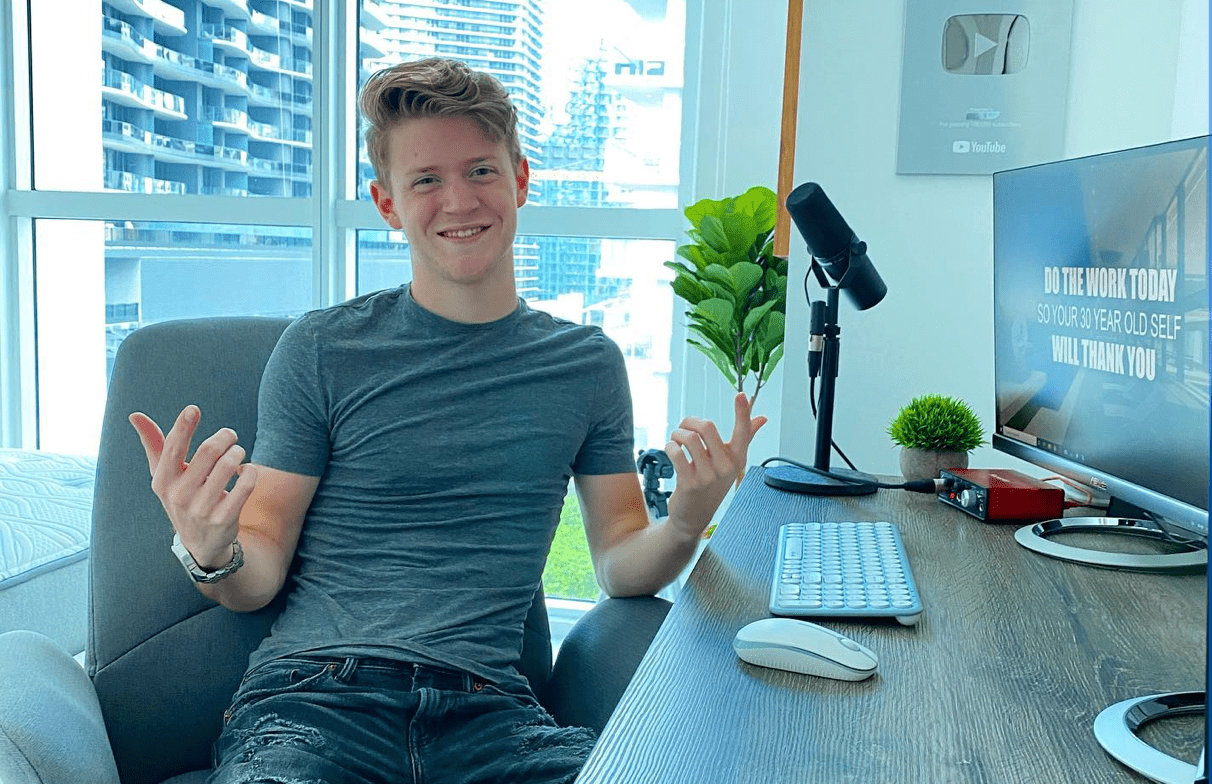Lifestyle
From High School Dropout to 22-Year-Old Millionaire: The Caleb Boxx Success Story

Many individuals grow up hearing the same things from their parents—you need to graduate high school, go to college and get a degree, and then you’ll land a nice, steady job that will support you and your family. There’s this belief ingrained in us all that our grades hold the key to our future. First to get into a good college, then to get a good job that makes our family proud.
The fact of the matter is a bit more bleak than the web our parents wove, however. Many study for years, take on thousands of dollars in debt, and then that degree they worked so hard for takes them to other places, or even nowhere. Or, they get the job and it isn’t anything like what they thought it would be. They’re miserable, they’re stuck, and they’re feeling hopeless.
Fortunately for some, like Caleb Boxx, founder of YouTube Automation and Automate Channels, they find out early on that the one-track plan for their future isn’t actually what they want. Boxx realized that there is more than just one road that can lead to success, and he started paving his own path at just 11 years old. Now, he’s a 22-year-old millionaire and he doesn’t have any regrets about the decisions he made to get where he is.
Starting Young
Entrepreneurship is a part of who Boxx is as a person. At 11 years old, instead of running around with his friends, Boxx created a website company. He would charge startups a fee to create their sites for them, though it’s probably safe to assume that none of them knew they had hired a child.
At 12 Boxx decided to take his wit and business savvy to YouTube, trying his hand as a gamer, though success didn’t strike right off the bat and he even quit the platform that his business now revolves around for a period of time.
“I started recording myself playing video games and nothing would ever happen,” said Boxx. “I was only earning $200 a month, so I quit the whole dream because it wasn’t working.”
At one point a friend of his went viral and amassed a million subscribers on YouTube. Boxx decided to once again chase his dreams, this time learning from someone who was already making that dream a reality. He turned into a livestream, donated the last $200 in his bank account, and asked for a quick call. He offered to edit his friend’s videos, write his scripts, and do a majority of his work all for free so he could gain admittance into his mastermind group.
This was the chance he needed and it wasn’t one he was going to waste. He wanted to be a professional so he started acting like one, gaining maturity and absorbing as much information about YouTube success as he could. He made vows with those in the mastermind group to focus solely on building their individual empires, setting a goal of reaching $1 million. Throughout this entire experience, he learned about more than just YouTube, he also learned about entrepreneurship.
Reaching Success
At just 16 Boxx used all the knowledge he had gained and created his first YouTube channel. A year later he made another one and immediately gained 80 thousand followers. After roughly six months with his channels, he was making around $20 thousand a month, a far cry from the $200 he started out with.
One thing led to another and he was giving 30% of his site revenue to one of his friends, helping them build their own successful channel. From there, revenue kept increasing and he was bringing in employees. At 18 he first started making seven figures, bought his dream car, moved to a new city, and started to study entrepreneurship more in depth.
It was at this point that people started to seek him out, asking if he could show them the ropes of YouTube and share the knowledge that helped him become successful on the platform. He created a business model and began to teach, allowing him to enter his 20s as a successful businessman. Now, Caleb offers a “done-for-you” mentorship program, where his company holds the hand of clients and manages all of their content.
The path Boxx chose wasn’t exactly orthodox or without challenges, but it was his own and something he wholeheartedly wanted. He went from a high school dropout to a 22-year-old millionaire, generating over $3 million from YouTube automations. Sometimes the path to success looks different than we thought it would, but with hard work and perseverance, anyone at any age can make their dreams a reality.
About Caleb Boxx
Caleb Boxx is a founder of YouTube Automation, a business model that allows people to automate their YouTube channels creating passive income. Boxx has helped hundreds of content creators. To learn more about Caleb Boxx, please visit https://www.automatechannels.com/
Lifestyle
When Seasons Shift: Dr. Leeshe Grimes on Grief, Loneliness, and Finding Light Again

Some emotional storms arrive without warning. A sudden change in weather, a holiday approaching, or even a bright sunny day can stir feelings that don’t match the world outside. For many people, the hardest seasons are not defined by temperature; they are defined by what’s happening inside, where grief and loneliness often move quietly.
This is the emotional terrain where Dr. Leeshe Grimes has spent her career doing some of her most meaningful work. As a psychotherapist, registered play therapist, retired U.S. Army combat veteran, and founder of Elevated Minds in the DMV area, she understands how deeply seasonal shifts and unresolved grief can affect people. Her upcoming books explore this very space, guiding readers through the emotional weight that can appear during different times of the year.
What sets Dr. Grimes apart is her ability to see clearly what many people overlook. Seasonal depression, for example, is usually tied to winter months. But she often sees it appear during warm, bright seasons, the times when the world seems happiest. For someone already grieving or feeling disconnected, watching others travel, celebrate, or gather can create its own kind of heaviness. Sunshine doesn’t always lift the mood; sometimes it highlights what feels missing.
The same misunderstanding surrounds grief. Society often treats it as a short-term experience with predictable phases and a clean ending. But in her practice, Dr. Grimes sees how grief keeps evolving. It doesn’t disappear on a timeline. It weaves itself into routines, memories, and milestones. People learn to carry it differently, but they rarely leave it behind completely. And that’s not failure, it’s human.
Her approach to mental health centers on truth rather than pressure. She encourages clients to acknowledge the emotions they try to hide: sadness that lingers longer than expected, moments of joy that feel out of place, and the waves of loneliness that return even when life seems stable. Instead of pushing for quick recovery, she focuses on helping people understand how emotions shift and how to care for themselves through those changes.
Much of her insight comes from her military years, where she witnessed the emotional toll of loss, transition, and constant survival. She saw how people continued functioning while carrying pain that had nowhere to go. That experience shaped her belief that healing requires space, space to feel, to speak, and to move through emotions without judgment.
In her clinical work today at Elevated Minds, she encourages people to build small, steady habits that anchor them during difficult seasons. Journaling helps them recognize patterns and name what feels heavy. Community support breaks the cycle of isolation. Therapy creates a place where emotions don’t have to be minimized or explained away. And intentional routines, daily sunlight, mindful breaks, and calm evenings help rebuild emotional balance.
Her upcoming books expand on these ideas, offering practical guidance for navigating both grief and seasonal depression. She focuses on helping readers understand that healing is not about escaping pain. It’s about learning how to live with it in a healthier way, honoring memories, acknowledging loneliness, and still allowing room for moments of light.
What makes Dr. Leeshe Grimes a compelling voice in mental health is her ability to bring language to experiences that many struggle to explain. She reminds people that emotional seasons don’t always match the weather and that there is no single path through grief. But within those shifts, she believes there is always a way forward.
The seasons will continue to change. And with the right tools, compassion, and support, people can change with them, finding steadiness, softness, and light again, one step at a time.
-

 Tech5 years ago
Tech5 years agoEffuel Reviews (2021) – Effuel ECO OBD2 Saves Fuel, and Reduce Gas Cost? Effuel Customer Reviews
-

 Tech6 years ago
Tech6 years agoBosch Power Tools India Launches ‘Cordless Matlab Bosch’ Campaign to Demonstrate the Power of Cordless
-

 Lifestyle7 years ago
Lifestyle7 years agoCatholic Cases App brings Church’s Moral Teachings to Androids and iPhones
-

 Lifestyle5 years ago
Lifestyle5 years agoEast Side Hype x Billionaire Boys Club. Hottest New Streetwear Releases in Utah.
-

 Tech7 years ago
Tech7 years agoCloud Buyers & Investors to Profit in the Future
-

 Lifestyle5 years ago
Lifestyle5 years agoThe Midas of Cosmetic Dermatology: Dr. Simon Ourian
-

 Health7 years ago
Health7 years agoCBDistillery Review: Is it a scam?
-

 Entertainment7 years ago
Entertainment7 years agoAvengers Endgame now Available on 123Movies for Download & Streaming for Free
